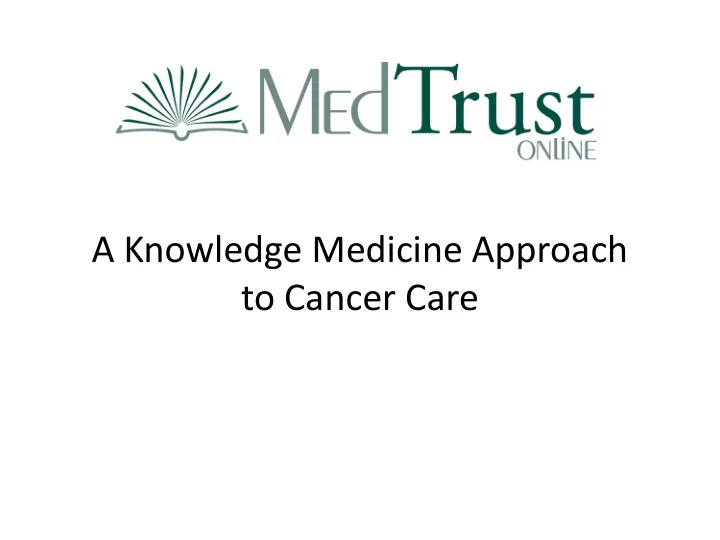

A Knowledge Medicine Approach to Cancer Care
The Promise of Personalized Medicine 2001 2011
What Do We Know Now Feb 2001 Feb 2011 • 60 completed genomes • Near 2,000 genomes • 1,500 Genes in OMIM DB • >13,000 Genes in OMIM DB • >700 GWAS projects underway “ …the once-hypothetical medical benefits of individual genome sequencing are beginning to be realized in the clinic. ” -- Francis Collins, Director of the NIH
• What Defines Clinically Important INDIVIDUALIZED Information?
Stomach Cancer Worldwide Statistics (2008) • #4 in incidence rate (1M, 8%) • #2 in deaths (737K, 10%) • 50% in East Asia Current Knowledge • Early Detection is difficult • Genetic Predisposition (CDH1) and Risk Factors (H. Pylori, diet) are known • Current treatment is hard (gastrectomy + chemoradiation) – 65% complete • New biomarkers are promising for identifying new therapies (HER2-Herceptin)
Finding the Latest About Gastric Cancer 5 million hits Top 10: WebMD, NCI, ACS 11-20: AMCs, Organizations 20-50: AMCs, News Page 7 & 8: 23&Me, Navigenics
Effective Transfer of Best Practices through Collaborative Medicine 11 Informal consultations 1 Expert 5 Community physicians 3 Cancer centers/hospitals 2 International (S.Am.)
And the Molecular Knowledge? Another stomach cancer case: 74 year-old male patient diagnosed with T3N2M0 gastric adenocarcinoma underwent total gastrectomy with D1 lymph node dissection. Two cycles of 5FU/LV chemotherapy were administered, followed by capecitabine + IMRT radiation therapy. Biomarkers for CDH1, HER2, or other genes of interest were not determined. Genetic markers were not seen as affecting the treatment plan post-surgery • Pharmacogenomic markers also not seen as important factors in determination of • treatment plan Patient experienced toxicity with chemotherapy and was unable to finish treatment plan. Although potentially informative, molecular information applied to individuals is not a common part of treatment planning.
Enabling Individualized Care • A Collaboration Platform can: – Inform Physicians about additional treatment options through peer interactions and expert guidance – Enable Physicians to take clinically-relevant actions and understand the value of molecular information for individual patients – Achieve better outcomes through the support of collective wisdom in medical decision making for their patients
Recommend
More recommend